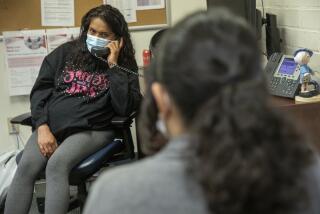Free Clinics Face Strain : They Could Be Overwhelmed With Patients if Prop. 187 Is Enforced
ORANGE — She is undocumented, she has six children and she is very confused.
The 30-year-old woman from Michoacan, Mexico, carried her 5-month-old baby and 5-year-old son into the Lestonnac Free Clinic on Thursday to get flu medicine for her children.
“I’m very worried,” said the woman, who wanted to remain anonymous because of her immigration status. “I have six children--that’s a lot to be worried about. I can come here for help, but I’m not sure about much of anything else anymore.”
The reason for her confusion: the passage of Proposition 187.
Lestonnac is one of a handful of free clinics in Orange County that provide care to the poor and uninsured but do not receive government funding or ask patients for documents. Such clinics could be flooded with patients if the initiative to deny undocumented immigrants basic health care from public providers is implemented, health-care officials said.
A lawsuit filed in Sacramento on Wednesday blocked public health-care providers from denying undocumented immigrants care. But if Proposition 187 survives legal challenges, centers such as Lestonnac could become undocumented immigrants’ only lifeline to health care.
Jean Forbath, a member of the board of directors of Share Our Selves, which also provides health care to the indigent but receives some public funding, said the clinic could be overwhelmed with patients if county medical clinics abide by the letter of the new law.
The clinic serves a significant Latino population but will not abide by the initiative, regardless of what the courts decide, Forbath said.
That means the clinic risks losing public funding from the state cigarette tax and other sources--which amounted to about $185,000 last year. Forbath said the clinic hopes to receive volunteer services and donated money to make up the possible loss in government funding.
Dr. Hugh Stallworth, the county’s director of public health, said free clinics in the county “probably have limited capacity,” but he is unsure how they will be affected by the new law.
Stallworth awaits state directions on implementing the law at county clinics. The state may give instructions on enforcing the law after a court hearing Wednesday, he said.
Sister Marie Therese Solomon, who started the Lestonnac clinic in 1979, said she has not seen an increase in patients since Tuesday’s election and has not thought about whether more patients will seek services at her clinic.
Solomon, who has been with the Sisters of the Company of Mary for more than 50 years, said she is concerned only about her patients’ well-being and did not want to give an opinion of the new state law.
“We look after the poorest of the poor,” Solomon said. “We don’t ask them for papers. Neither do we intend to.”
Her center gets money only from corporate donors and grants, as well as from the United Way--not federal or state dollars, she said. About 50 doctors volunteer their services at Lestonnac.
*
Between 500 and 600 patients go to the clinic each month, Solomon said. Some sat in the clinic waiting room Thursday as a doctor called in patients one by one.
A Nicaraguan woman said she took three buses from her home in Fullerton, with three children, to get to Lestonnac.
The woman, who also asked that her name not be used because of her immigration status, said she cannot afford regular health care because she is uninsured. She and her husband obtained work permits when they applied for political asylum, but she was confused about how she could obtain urgent and costly health care without possessing a green card.
“We can’t give up our health care,” the woman said. “If you’re not healthy, you can’t work.”
The woman from Michoacan, sitting beside her, nodded as she gave her baby daughter a bottle of milk.
“I think (Proposition 187) is terrible,” she said, adding that she moved to California in 1986. “We can keep coming (to the clinic), but what about my children in school? Two of them were born in Mexico and the other four were born here. What will happen to them?”
Both women said they did not think the law’s limitations on health and social service benefits would stop illegal immigration or force people to give up and go back to their home countries.
“We will leave if worse comes to worst,” said the woman from Michoacan, with an uncertain smile. “But in that case, we wouldn’t be leaving--they’d be carrying us out in a truck.”
More to Read
Sign up for Essential California
The most important California stories and recommendations in your inbox every morning.
You may occasionally receive promotional content from the Los Angeles Times.










